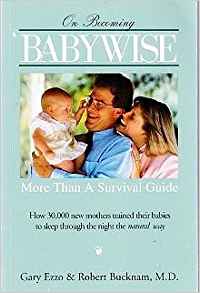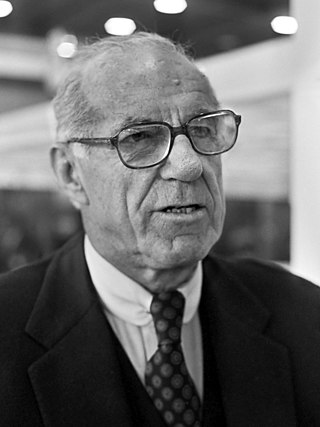
Benjamin McLane Spock was an American pediatrician and left-wing political activist whose book Baby and Child Care (1946) is one of the best-selling books of the twentieth century, selling 500,000 copies in the six months after its initial publication in 1946 and 50 million by the time of Spock's death in 1998. The book's premise told mothers, "You know more than you think you do." Spock's parenting advice and recommendations revolutionized parental upbringing in the United States, and he is considered to be amongst the most famous and influential Americans of the 20th century.
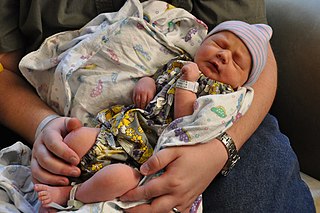
An infant or baby is the very young offspring of human beings. Infant is a formal or specialised synonym for the common term baby. The terms may also be used to refer to juveniles of other organisms. A newborn is, in colloquial use, an infant who is only hours, days, or up to one month old. In medical contexts, a newborn or neonate is an infant in the first 28 days after birth; the term applies to premature, full term, and postmature infants.
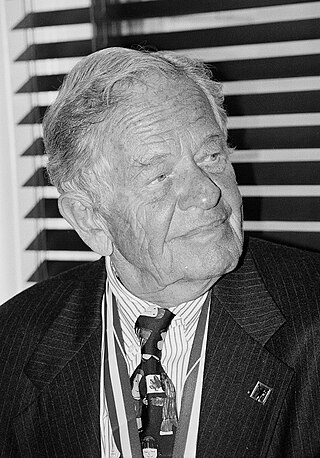
Thomas Berry Brazelton was an American pediatrician, author, and the developer of the Neonatal Behavioral Assessment Scale (NBAS). Brazelton hosted the cable television program What Every Baby Knows, and wrote a syndicated newspaper column. He wrote more than two hundred scholarly papers and twenty-four books.

Attachment parenting (AP) is a parenting philosophy that proposes methods aiming to promote the attachment of parent and infant not only by maximal parental empathy and responsiveness but also by continuous bodily closeness and touch. The term attachment parenting was coined by the American pediatrician William Sears. There is no conclusive body of research that shows Sears' approach to be superior to "mainstream parenting".
Co-sleeping or bed sharing is a practice in which babies and young children sleep close to one or both parents, as opposed to in a separate room. Co-sleeping individuals sleep in sensory proximity to one another, where the individual senses the presence of others. This sensory proximity can either be triggered by touch, smell, taste, or noise. Therefore, the individuals can be a few centimeters away or on the other side of the room and still have an effect on the other. It is standard practice in many parts of the world, and is practiced by a significant minority in countries where cribs are also used.
William Penton Sears, also referred to as Dr. Bill, is an American pediatrician and the author or co-author of parenting books. Sears is a celebrity doctor, and has been a guest on various television talk shows. Sears is a proponent of the attachment parenting philosophy, and is most well known for authoring The Baby Book, which popularized that style of parenting.

Toilet training is the process of training someone, particularly a toddler or infant, to use the toilet for urination and defecation. Attitudes toward training in recent history have fluctuated substantially, and may vary across cultures and according to demographics. Many of the contemporary approaches to toilet training favor a behaviouralism- and cognitive psychology-based approach.

Babywearing is the practice of wearing or carrying a baby in a sling or in another form of carrier. Babywearing has been practiced for millenia around the world. Babywearing is a form of baby transport which can be used for as long as mutually desired, often until toddlerhood and beyond. In the industrialized world, babywearing has gained popularity in recent decades. Part of the reason for this shift is due to the influence of advocates of attachment parenting.
Marc Weissbluth is an American pediatrician who has written several books on infant sleep. He is a sleep disorders specialist at the Children's Memorial Hospital in Chicago.
Richard Ferber is a physician and the director of The Center for Pediatric Sleep Disorders, at Children's Hospital Boston. He has been researching sleep and sleep disorders in children for over 30 years. He is best known for his methods—popularly called Ferberization—that purports to teach infants to learn how to fall asleep on their own, which are described in his book Solve Your Child's Sleep Problems.
The Ferber method, or Ferberization, is a technique invented by Richard Ferber to solve infant sleep problems. It involves "sleep-training" children to self-soothe by allowing the child to cry for a predetermined amount of time at intervals before receiving external comfort.

Swaddling is an ancient practice of wrapping infants in blankets or similar cloths so that movement of the limbs is tightly restricted. Swaddling bands were often used to further restrict the infant. Swaddling fell out of favour in the 17th century.
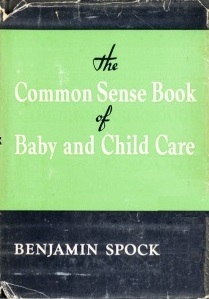
The Common Sense Book of Baby and Child Care is a book by American pediatrician Benjamin Spock and one of the best-selling books of the twentieth century, selling 500,000 copies in the six months after its initial publication in 1946 and 50 million by the time of Spock's death in 1998. As of 2011, the book had been translated into 39 languages.
Secrets of the Baby Whisperer: How to Calm, Connect, and Communicate with Your Baby is a 2001 book by Tracy Hogg and Melinda Blau, aimed at guiding new parents through their baby's first year.

Crying is the dropping of tears in response to an emotional state or pain. Emotions that can lead to crying include sadness, anger, excitement, and even happiness. The act of crying has been defined as "a complex secretomotor phenomenon characterized by the shedding of tears from the lacrimal apparatus, without any irritation of the ocular structures", instead, giving a relief which protects from conjunctivitis. A related medical term is lacrimation, which also refers to non-emotional shedding of tears. Various forms of crying are known as sobbing, weeping, wailing, whimpering, bawling, and blubbering.

Harvey Neil Karp, FAAP is an American pediatrician, author, and child development specialist. He is best known for his book "The Happiest Baby on the Block" and its accompanying DVD, that use his "5 S's" approach to infant care. He is also the creator of the Snoo, a smart bassinet.
Bringing Up Baby is a four-part British television documentary series which compares three different childcare methods for babies: the Truby King method, the Benjamin Spock approach, and the Continuum concept. Each method was advocated and administered by a nanny for two families each. The series was controversial when it aired on Channel 4 in 2007, particularly due to the actions recommended by Truby King advocate Claire Verity, and questions over Verity's qualifications.
Sleep training is a set of parental intervention techniques with the end goal of increasing nightly sleep in infants and young children, addressing “sleep concerns”, and decreasing nightime signalling. Although the diagnostic criteria for sleep issues in infants is rare and limited, sleep training is usually approached by parent(s) or caregivers self indentifying supposed sleep issues.
Newborn care and safety are activities and precautions recommended for new parents or caregivers. It is an educational goal of many hospitals and birthing centers to promote newborn care and safety as parents take their infant home.
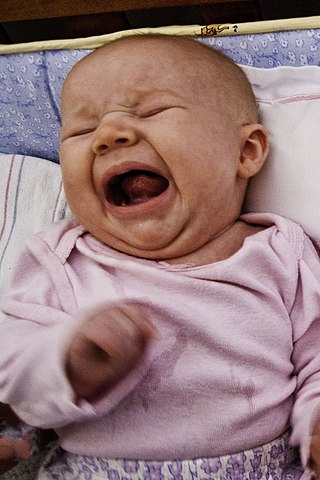
Infant crying is the crying of infants as a response to an internal or external stimulus. Infants cry as a form of basic instinctive communication. Essentially, newborns are transitioning from life in the womb to the external environment. Up to 27% of parents describe problems with infant crying in the first four months. Up to 38% identify a problem with their infant crying within the first year. Parents can be concerned about the amount of time that their infant cries, how the infant can be consoled, and disrupted sleeping patterns. Colic is used as a synonym for excessive crying of infants, even though colic may not be the cause of excessive crying.
